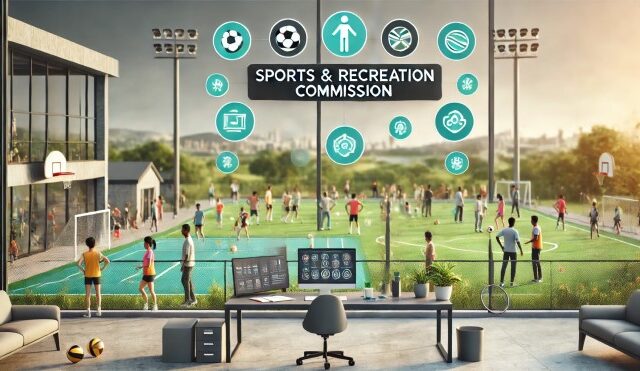The concept of sports and recreation commissions exists globally as an integral part of promoting healthy lifestyles, fostering community engagement, and nurturing national pride through sports. These commissions work to provide citizens with opportunities to engage in both recreational and professional sports, support local sporting talent, and ensure inclusivity in all recreational activities. In this article, we’ll explore the role, impact, and unique legislation of sports and recreation commissions, with particular emphasis on the “Sports and Recreation Commission Act,” the “Lesotho Sport and Recreation Commission,” the “Lesotho Sports and Recreation Commission,” and the “Sports and Recreation Commission Zimbabwe.” We’ll also delve into their responsibilities, challenges, and importance in modern society.
What is a Sports and Recreation Commission?
A sports and recreation commission is a governmental or semi-governmental body that oversees the development, organization, and regulation of sports and recreational activities within a specific region or country. The primary aim of such commissions is to promote physical fitness, ensure accessibility to recreational facilities, develop local sports talent, and bring together communities through shared activities.
Sports and recreation commissions are critical in implementing policies that encourage physical activities across all age groups, with a focus on health benefits, community cohesion, and national unity. They often work in conjunction with other government bodies, non-governmental organizations, and private entities to achieve their objectives.
Key Functions and Responsibilities of Sports and Recreation Commissions
- Promoting Physical Fitness and Health
One of the primary goals of sports and recreation commissions is to promote an active lifestyle and encourage citizens to engage in sports and physical activities. By organizing sports events, marathons, fitness workshops, and health awareness campaigns, these commissions create avenues for citizens to improve their physical and mental well-being. - Fostering Community Engagement and Social Integration
Sports have long been recognized as a powerful tool for social integration. Sports and recreation commissions work to break down social barriers by creating inclusive spaces where people from all walks of life can come together. This integration fosters unity, encourages tolerance, and builds lasting relationships within communities. - Developing National Talent and Supporting Professional Athletes
For a country to excel in sports on the international stage, it needs a robust system that nurtures young talent and provides pathways to professional sports. Sports and recreation commissions play a pivotal role in scouting talent, organizing training camps, and providing support for young athletes. By offering scholarships, grants, and mentorship programs, these commissions help aspiring athletes reach their potential. - Managing Recreational Facilities
Recreational facilities like parks, sports complexes, swimming pools, and gyms require proper management and maintenance. Sports and recreation commissions are often tasked with overseeing these facilities to ensure they are safe, accessible, and well-maintained. - Policy Development and Implementation
Sports and recreation commissions contribute significantly to policy development. They work with lawmakers and government officials to create policies that promote sports and recreation, protect athletes’ rights, and regulate sporting activities. In addition, they ensure that sports and recreational activities align with national values and cultural practices. - Promoting Inclusivity and Accessibility in Sports
Ensuring that sports and recreational activities are accessible to all individuals, regardless of gender, age, ability, or socioeconomic status, is a top priority for sports and recreation commissions. Programs for people with disabilities, women’s sports leagues, and youth sports initiatives are some of the ways these commissions promote inclusivity.
Sports and Recreation Commission Act: An Overview
The Sports and Recreation Commission Act is legislation designed to govern the operation, powers, and responsibilities of sports and recreation commissions. Although specific acts may vary from country to country, they generally outline the mandate of the commission, its funding mechanisms, and its operational framework.
In some regions, the Act empowers the sports and recreation commission to form partnerships with private sectors, local governments, and international bodies to further their objectives. The legislation may also specify the commission’s role in regulating sports clubs, setting standards for sports facilities, and safeguarding the rights of athletes.
Lesotho Sport and Recreation Commission
The Lesotho Sport and Recreation Commission (LSRC) is a notable body tasked with developing and promoting sports and recreational activities across the Kingdom of Lesotho. It operates under the mandate of the Lesotho government, primarily focusing on fostering local talent, supporting grassroots sports programs, and promoting inclusivity in sports.
Key Roles of the Lesotho Sport and Recreation Commission
- Youth Development Programs: The LSRC places a strong emphasis on nurturing young talent by providing access to training facilities, experienced coaches, and mentorship opportunities. These programs aim to prepare young athletes for national and international competitions.
- Promotion of Traditional Sports: The LSRC also plays a role in preserving and promoting Lesotho’s traditional sports, which are a part of the country’s rich cultural heritage. By organizing events around traditional games, they help keep these customs alive and encourage cultural pride among Basotho people.
- Women in Sports Initiatives: Recognizing the importance of gender inclusivity, the LSRC runs initiatives that encourage women’s participation in sports. These programs provide resources and support for women athletes, promoting gender equality in sports at all levels.
Lesotho Sports and Recreation Commission
Another significant body in Lesotho is the Lesotho Sports and Recreation Commission (LSRC), which functions similarly to the Lesotho Sport and Recreation Commission. While the two commissions share similar goals, they may operate under different government departments or with distinct focuses. The LSRC is involved in promoting sports as a means of national pride and international representation, as well as building a sports culture in Lesotho.
Key Functions of the Lesotho Sports and Recreation Commission
- Organizing National Sports Events: The LSRC is responsible for organizing large-scale national sports events that bring together athletes from across the country. These events foster national unity and offer local athletes an opportunity to showcase their skills.
- Building Infrastructure for Sports and Recreation: The LSRC is heavily involved in developing and maintaining sports facilities across Lesotho. By ensuring these facilities are available and up to standard, the commission promotes a sports-friendly environment.
- Encouraging Community Participation: Through recreational events and workshops, the LSRC encourages communities to engage in physical activities, ultimately contributing to the general well-being and social cohesion of Basotho communities.
Sports and Recreation Commission Zimbabwe: Contact Details and Overview
The Sports and Recreation Commission Zimbabwe (SRC) serves a similar purpose to the commissions in Lesotho, promoting sports and recreational activities within Zimbabwe. As an authoritative body, the SRC works under the purview of the Zimbabwean government, with a particular focus on developing local talent, encouraging physical fitness, and providing regulatory oversight.
Key Roles and Initiatives of the Sports and Recreation Commission Zimbabwe
- Talent Identification and Development: The SRC is committed to identifying potential athletes at an early age and providing them with the necessary support to succeed in professional sports.
- Sports Policy and Regulatory Oversight: The SRC regulates sports organizations and clubs within Zimbabwe, ensuring they operate ethically and in line with national policies. The commission also monitors compliance with safety standards in recreational facilities.
- Contact Information:
While the Sports and Recreation Commission Zimbabwe operates multiple offices across the country, inquiries are typically handled at the head office, which is responsible for overseeing all sports-related activities within Zimbabwe.
Challenges Faced by Sports and Recreation Commissions
- Funding Constraints
Many sports and recreation commissions face budget limitations, which restrict their ability to develop infrastructure, support athletes, and organize events. This challenge is especially prevalent in developing countries, where limited government resources are often allocated to other priority sectors. - Access and Inclusivity Issues
Despite the emphasis on inclusivity, some populations still face barriers to accessing sports facilities and programs. These barriers could be physical, economic, or social. Sports and recreation commissions are continuously working to remove these obstacles but face significant challenges. - Balancing Professional and Recreational Sports
While developing professional athletes is crucial for a nation’s international representation, recreational sports are equally important for community health and wellness. Sports and recreation commissions often struggle to strike a balance between promoting elite sports and encouraging recreational participation. - Public Awareness and Engagement
In some areas, there is a lack of awareness about the benefits of sports and recreation. Encouraging communities to participate in organized sports requires educational efforts, and sports commissions often face challenges in raising awareness on a large scale.
Conclusion: The Future of Sports and Recreation Commissions
Sports and recreation commissions play a vital role in shaping the health, culture, and identity of nations. By fostering a sports culture, these commissions contribute to the overall well-being of communities, create opportunities for youth development, and build national pride. The Sports and Recreation Commission Act, along with dedicated bodies like the Lesotho Sport and Recreation Commission, Lesotho Sports and Recreation Commission, and Sports and Recreation Commission Zimbabwe, illustrate the important contributions these entities make in their respective countries.
As global interest in health and wellness grows, the work of sports and recreation commissions will become even more significant. With continued support, these commissions can overcome funding challenges, improve inclusivity, and ultimately create a world where everyone has the opportunity to participate in sports and recreation activities. Through their initiatives, sports and recreation commissions are not only building a stronger, healthier populace but also promoting a legacy of national pride and unity through the joy of sports.



MOST COMMENTED
Business
World Politics News: Geopolitical Analysis for Strategic Decision-Makers
Business
World News Headlines: Global Developments Impacting Business and Policy
Business
Top World News Stories: What’s Shaping the Globe Today?
World News
Global News Updates: Stay Informed with Key Events
Crypto
“Current World News: Major Stories of 2025”
Crypto
Be1crypto.com Markets is a cryptocurrency trading platform designed to cater to both novice and experienced traders. It offers a user-friendly interface, a wide range of supported cryptocurrencies, advanced trading tools, and robust security measures. The platform aims to provide a seamless trading experience, allowing users to diversify their portfolios and engage in various trading activities.
World News
Chrisley Knows Best Daughter Dies: Unraveling the Truth Behind the Rumors